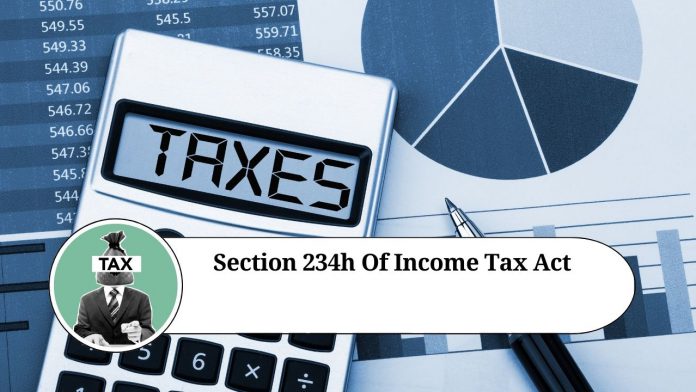Filing Income Tax Returns (ITR) is an annual obligation for taxpayers. The Income Tax Act, of 1961, lays down various provisions for filing ITRs, including deadlines and penalties for non-compliance. The penalties for late filing of ITRs are governed by Section 234H of the Income Tax Act. This section lays down the provisions for penalties and interest charges for non-filing or late filing of ITRs.
What is Section 234H of the Income Tax Act?
Section 234H of the Income Tax Act, 1961, was introduced in the Finance Act 2017. It lays down the provisions for penalties for late filing of ITRs. This section applies to ITRs filed for the assessment year 2018-19 and onwards.
Applicability of Section 234H The provisions of Section 234H apply to taxpayers who fail to file their ITRs within the prescribed due date. The due date for filing ITRs is 31st July of the assessment year. For example, for the assessment year 2022-23, the due date for filing ITRs is 31st July 2023.
Penalty under Section 234H As per Section 234H, a taxpayer who fails to file their ITR by the due date will be liable to pay a penalty of Rs. 1,000 for each day of default. The penalty will be levied from the day following the due date till the date of the actual filing of the ITR. However, the total penalty amount cannot exceed Rs. 1,00,000 or the amount of tax payable, whichever is lower.
For example, if a taxpayer files their ITR on 15th August 2023, i.e., 15 days after the due date of 31st July 2023, the penalty levied under Section 234H will be Rs. 15,000 (15 days x Rs. 1,000 per day).
Interest under Section 234H Apart from the penalty, a taxpayer who fails to file their ITR by the due date will also be liable to pay interest under Section 234A, 234B, and 234C of the Income Tax Act. These sections deal with interest charges for delay in filing ITR, delay in payment of advance tax, and shortfall in payment of advance tax, respectively.
Consequences of Non-Compliance Non-compliance with the provisions of Section 234H can lead to several consequences for taxpayers. Some of the key consequences are:
- Increased financial burden: Late filing of ITRs can lead to the imposition of penalties and interest charges, which can significantly increase the financial burden on taxpayers.
- Loss of benefits: Non-filing or late filing of ITRs can lead to the loss of benefits such as carry-forward of losses, claiming deductions and exemptions, etc.
- Legal action: In case of repeated non-compliance, the Income Tax Department may initiate legal action against taxpayers, which can lead to fines and imprisonment.
Conclusion:
Section 234H of the Income Tax Act lays down the provisions for penalties and interest charges for non-filing or late filing of ITRs. The penalties under this section are significant, and taxpayers should ensure that they file their ITRs within the prescribed due date. Late filing of ITRs can lead to several consequences, including increased financial burden, loss of benefits, and legal action. It is, therefore, important for taxpayers to comply with the provisions of Section 234H to avoid such consequences
Read more useful content:
- section 145 of income tax act
- section 10e of income tax act
- section 9 of the income tax act
- section 94b of income tax act
- section 206aa of income tax act
Frequently Asked Questions:
Q: What is Section 234H of the Income Tax Act?
A: Section 234H is a provision under the Income Tax Act that pertains to the late filing of income tax returns.
Q: Who is liable to pay the penalty under Section 234H?
A: Any individual who files their income tax return after the due date specified under Section 139(1) of the Income Tax Act and has a tax liability of over Rs. 10,000 is liable to pay a penalty under Section 234H.
Q: What is the penalty amount under Section 234H?
A: The penalty amount under Section 234H is Rs. 1,000 per day for each day of delay, subject to a maximum amount of Rs. 1,00,000.
Q: When does the penalty under Section 234H become applicable?
A: The penalty under Section 234H becomes applicable if an individual files their income tax return after the due date specified under Section 139(1) of the Income Tax Act and has a tax liability of over Rs. 10,000.
Q: Can the penalty under Section 234H be waived?
A: No, the penalty under Section 234H cannot be waived.
Q: How can an individual avoid the penalty under Section 234H?
A: An individual can avoid the penalty under Section 234H by filing their income tax return on or before the due date specified under Section 139(1) of the Income Tax Act or by ensuring that their tax liability is less than Rs. 10,000.
Q: Can an individual claim a refund of the penalty paid under Section 234H?
A: No, an individual cannot claim a refund of the penalty paid under Section 234H.
Q: Is Section 234H applicable for delayed filing of revised income tax returns?
A: No, Section 234H is not applicable for delayed filing of revised income tax returns.
Q: What are the consequences of not paying the penalty under Section 234H?
A: Non-payment of the penalty under Section 234H can result in additional interest and penalty under other provisions of the Income Tax Act.




















